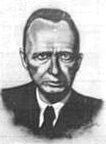Heinrich Germer (politician)
Heinrich Germer (born August 18, 1900 in Magdeburg , † June 17, 1952 in Magdeburg) was an SED politician and city councilor for popular education and culture in Magdeburg.
Life
Germer, whose father was a civil servant, first attended an elementary school from 1906 to 1909 and then until 1914 the Magdeburg High School . He then left Magdeburg and attended a preparatory institute . In 1917 and 1918 he attended the teacher training college in Eilenburg . In June 1918, however, he had to interrupt his training due to his conscription to the military. After the end of the First World War , he continued his training elsewhere. After completing his exam in 1920, he took a job as a teacher in Ammendorf . In 1922 he began studying German , history , psychology and education at the University of Halle (Saale) , after which he took a position as a teacher at the secular experimental school in Halle in 1927 .
After the National Socialists came to power , he was banned from teaching geography and history in 1935. From 1938 he was drafted first for maneuvers and later for military service in the German armed forces. Germer fell into British captivity, from which he was released in July 1945.
Germer joined the SPD in September 1945 . After the SPD was united with the KPD in the Soviet occupation zone in 1946 , the man who returned to Magdeburg belonged to the SED. In October 1945 he took over the position of headmaster in the 15th elementary school in Magdeburg. Germer took over the organization of the reconstruction of the adult education centers in Saxony-Anhalt and from March 1947 was the full-time director of the adult education center in Magdeburg. In the same month Germer also took over the office of city chairman of the Kulturbund , on whose board he was also elected at state level. Germer was also a member of the presidium of this organization. In 1947 Germer was also a member of the Magdeburg SED district executive. In July 1948 he succeeded Oskar Linke as city councilor for popular education and culture.
Act
In this role he played a key role in the reconstruction of the city of Magdeburg, which was badly destroyed in World War II . In addition to building schools, he was primarily responsible for the cultural sector. In particular, the construction of the cultural history museum, the Gruson greenhouses , a theater and the library are linked to his work. The establishment of new kindergartens and the opening of a zoological garden were also part of his work.
Honors
In 1952, the year of his death, a newly built school in the Magdeburg-Nordwest district of Magdeburg , which goes back to his commitment, was named after him. An adjacent street also received his name, but was renamed Hugo-Junkers-Allee again after the end of the GDR . The Heinrich-Germer-Stadion in the Magdeburg-Sudenburg district bears his name.
Literature / source
- Janusch Daum: Germer, Heinrich. In: Guido Heinrich, Gunter Schandera (ed.): Magdeburg Biographical Lexicon 19th and 20th centuries. Biographical lexicon for the state capital Magdeburg and the districts of Bördekreis, Jerichower Land, Ohrekreis and Schönebeck. Scriptum, Magdeburg 2002, ISBN 3-933046-49-1 .
| personal data | |
|---|---|
| SURNAME | Germer, Heinrich |
| BRIEF DESCRIPTION | German politician (SED) |
| DATE OF BIRTH | 18th August 1900 |
| PLACE OF BIRTH | Magdeburg |
| DATE OF DEATH | June 17, 1952 |
| Place of death | Magdeburg |
